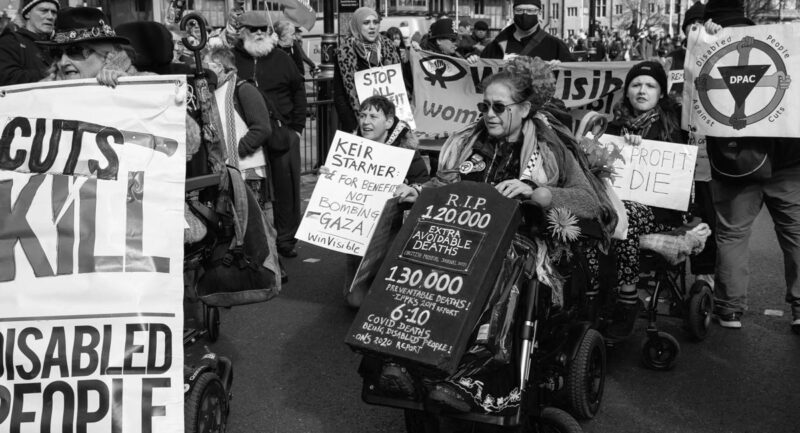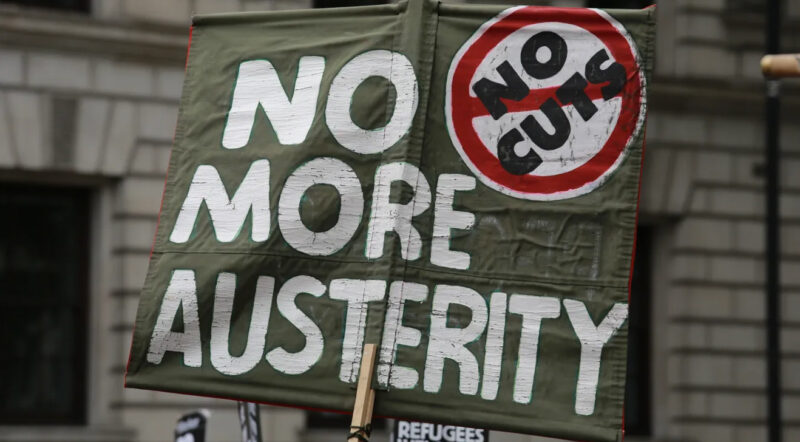Anti-cuts struggle escalates in Spain
By K Tait
Hundreds of masked, black-clad police advancing, firing rubber bullets into the backs of fleeing protesters. In a side street, young people confronting vans of riot police behind a blazing barricade.
These were the streets of Madrid as Spain’s government announced a further £8billion of cuts to education, health and welfare spending in next year’s budget.

From Lisbon to Athens, via Paris, millions occupied streets and squares to demand an end to austerity.
Spain, with its own pro-cuts government, is taking Greece’s place as the eye of the storm. Millions turned out for three demonstrations in five days against the wave after wave of cuts which are destroying jobs and communities with the aim of boosting profits for the rich.
Cuts don’t work
Years of austerity have been a disaster for Spain. The latest tranche comes after £22 billion was slashed from the budget in this year alone. Total unemployment is above 25% and the latest bailout of the banks will be paid for by millions of Spanish workers through £50billion in cuts to their jobs and pay.
More than 100,000 public sector workers have already been sacked. Those who remain are enduring a third year of pay freezes, while workload intensifies as fewer employees attempt to compensate for the shortfall.
With youth unemployment pushing 55 per cent, there is no shortage of the angry, young and poor ready to defy the police curfews. During the ‘Besiege Congress’ demonstration on 25 September, thousands of youthful indignados abandoned their previous peaceful tactics and tried to storm the police barriers shielding Spain’s political elite. As yet, however, the anger and the energy of this movement have not been codified into a political strategy, a programme, that could take it beyond protest.
After the months of bitter struggle by miners and their communities to defend their jobs, the increasing violence of the protests reveals growing anger, not only against Mariano Rajoy and his right-wing government but also at the failure of the political and trade union leadership of the working class to organise genuine resistance.
The Berlin connection
The Spanish government is desperate to avoid the fate of Greece – an EU bailout that would grant the EU, European Central Bank and IMF control over its budget. The Spanish Prime Minister says the new cuts package “promises hope” – but hope for whom? Certainly not the millions of low paid and middle-income workers who are battling the destruction of whole industries. Not for the youth who are emigrating in shocking numbers to escape poverty and destitution in their own land.
No. The real hope is held out to the billionaire speculators, the German banks, and the system of profit that has bailed out Spain’s bankrupt capitalists, who will repay their debts by bleeding the Spanish working class dry.
The profit-driven speculation, bubble and inevitable crash in the Spanish construction industry was a disaster entirely of the bosses’ making. Spain’s banks, which engineered, managed and profited handsomely from the bubble, have been bankrupted by their own reckless gambling.
Europe’s capitalists are willing to bail them out – so long as they can be certain of getting a good return on their ‘investment’. The investment will be repaid – with interest – on the backs of Spanish workers and their European brothers and sisters.
But repayment of debts is not the limit of European capitalists’ plans. The Fiscal Treaty, which is to be used to enforce austerity right across the continent, is also the first step towards a future imperialist superstate capable of competing with the US and China. September’s 50,000 strong demonstration in Paris against the Fiscal Treaty should also be a step forward – to Europe wide resistance – from Portugal to Poland and from Britain to Greece.
Crisis of Leadership
The leaders of Europe’s biggest trade unions sit at the head of potentially the most powerful, organised and numerous social force in Europe.
But in Spain, as elsewhere, the union leaders have stuck to their strategy – limited one day strikes and mass demonstrations followed by long periods of inaction – a strategy which can only lead to defeat. Desperate to maintain their privileged positions as negotiators between the working class, the government and the employers, union bosses and reformist politicians have exercised a smothering control over these protests. Why? To prove their ‘responsible’ credentials and come to a ‘negotiated solution’ with the bosses. Some hope!
Given the severity of this crisis of the capitalist system such a ‘solution’ could be nothing less than negotiating away the results of decades of struggle; hard-won employment rights, public services and the rights of women, minorities and youth.
Insecurity, flexibility and profitability are the objectives of endless cuts. If the privileged leaders of the working class are too compromised by their association with the bosses, then we need to fight for the working class to build truly independent, accountable bodies capable of co-ordinating and leading action.
We need to organise the grass roots of the unions, the unorganised workers, the unemployed youth, to create local committees of action, elected in the workplaces but also in the squares and the communities blighted by unemployment. We need to draw in the immigrant workers, defending them against police and right wing attack.
But the struggle is above all a political one – the austerity governments must be driven from power and for that we need parties. Greece this year showed that. But we need class struggle parties that are not afraid to openly say we are fighting for power, power to change the world and end the exploitation and austerity of capitalism for good.
With such organisations it would be possible to launch not just a one day strike but an all out, indefinite general strike to smash the austerity programme and drive out Rajoy and his party. It would then be possible, and necessary, to demand that all the parties and unions that have fought in the struggle unite to create a workers’ government to make the rich pay for their crisis and provide jobs and restore services on the road to a socialist Spain.
Independence is no solution
The Spanish government, doing its best to carry out the wishes of its capitalist backers, is besieged from all sides. While Germany and the ‘international markets’ demand ever-deeper cuts to ensure Spain repays its debts, Spain faces a deepening social crisis as the central government becomes unable or unwilling to rescue bankrupt regional governments.
The million-strong demonstration for Catalan independence in Barcelona on 11 September reveals the growth of secessionist ideas that express both a rejection of State austerity and a popular desire for greater democratic control.
In reality, an independent and prosperous capitalist Catalonia is an illusion, a pipe dream. Wrapped in populist and even left-wing slogans, its foundations lie in the naked self-interest of the region’s wealthy bosses, who don’t want to see their profits used to subsidise poorer areas. A new, tiny country would be even weaker against the ravages of the international capitalist speculators and bond-markets. The economic price would be the sacrifice of public services.
The reaction of the Spanish military, “We will do everything to protect the integrity of the Spanish state” is an ugly reminder of the role the army generals played in defending Franco’s dictatorship. Of course, the Catalans and the Basques should have the right to determine whether to stay as part of the Spanish state and if they wish to secede they must be aided to do so by the entire Spanish workers’ movement. But, for socialists, such a separation should not be our goal.
The future of Spanish workers lies with one another and with all the workers of Europe. The undemocratic, imperialist EU is a bosses’ club, which exists to defend the common interests of Europe’s ruling classes. The crisis has exposed it as a naked instrument of class rule. That’s why we need to raise the call for a socialist united states of Europe.
EU wide action
The system of interlinked loans, debts and austerity packages ensures that the capitalists of wealthy countries, such as France, Germany and Britain, can protect “their” economies by busting the economies of weaker ‘peripheral’ countries.
The governments of Europe’s dominant countries are exploiting and looting the economies of fellow-EU members, just as they loot their client states in Africa and Asia.
Austerity is not a national disease – it’s the general policy of the banks, the bosses and their politicians. It is the international policy of finance capital that serves the strong and preys on the weak.
This means our resistance must rise to the same, international, level. Each demonstration in a European capital provides huge support and inspiration to those struggling in neighbouring countries.
International gatherings of activists from the unions, the occupation movements and the youth will take place in London in October, in Madrid and Florence in November. A further gathering is planned in Greece next year. We should send representatives from all the fighting unions, campaigns and movements so that these meetings can be used to plan a strategic response.
Important as national days of action are, co-ordinated action on a European scale would have an even greater impact. A Europe wide, one-day general strike would give our rulers notice that we will not endure the destruction of our jobs, our future, our health and education systems. It would be a strategic step forwards for a working class which, at present, remains divided by national prejudices and circumstances.









